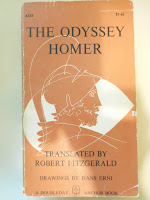There’s nothing like learning about the past while being an armchair traveler. By reading about early explorers, we avoid all the dirt, smell, and exhaustion. Better yet, we get to read what places, buildings, and countries looked like in bygone days.
When we read Homer’s Odyssey, we travel through the Mediterranean Sea, visiting places that no longer exist. We follow the Greeks, particularly Odysseus, as he and his intrepid men meet gods, goddesses and mythological creatures. More than that, Homer describes the shores, buildings, and peoples Odysseus encounters, their customs, clothing, and food. This timeless tale takes readers from the beaches of Troy to the shores of Ithaca where his faithful wife Penelope weaves and unweaves, waiting for Odysseus to return.
When we read the Odyssey in Greek, we hear the music through the meter of each verse. When I was studying Classics, we read Robert Fitzgerald’s translation of this long, narrative poem. There are modern day translators whose rendition of Homer is printed in prose or in verse, Robert Fagles being the latest to render Homer in verse. Why not try an audio book of this tale. Naxos’ Odyssey uses the William Cowper’s 1791 verse translation. Here is a link to audio clips https://www.naxos.com/catalogue/item.asp?item_code=NA303112
Or you could follow the Trojan Aeneas as he, his son and father journey to Italy and ultimately found Rome. Virgil tells the tale of the Aeneid in verse, splendidly translated into verse by C.Day Lewis. Here too, readers travel with Aeneas across the Mediterranean Sea, stopping here and there and most especially in Carthage where our hero meets Dido. We are most fortunate if we can listen to an excellent audio performance. Naxos’ Aeneid uses Lewis’ translation. Listen to clips here https://www.naxos.com/catalogue/item.asp?item_code=NA0196
One more ancient traveler to read as he journeys from here to there is
Herodotus. His Histories include founding story myths, battles, countries, customs, and descriptions of the countryside. Herodotus is “the Father of History,” the first to compile and recount the histories of many places and peoples. His narrative history describes the pyramids and the Hellespont, and the hanging gardens of Babylon. Once again, I’d listen to the book recorded by Naxos https://www.naxos.com/catalogue/item.asp?item_code=NA0225
There’s a contemporary book that follows Herodotus journey called Travels with Herodotus by Ryszard Kapuściński. As he travels to the east, Kapuściński takes Herodotus with him and compares the sights and sounds and geography in a captivating travelogue https://www.goodreads.com/book/show/59664.Travels_with_Herodotus
Through the words of the Greeks and Romans, the ancient world comes alive. What better way to learn about the past than to travel through these timeless tales.
Stay tuned. Tomorrow, day 4 we'll do some armchair traveling using guidebooks.




No comments:
Post a Comment